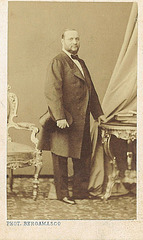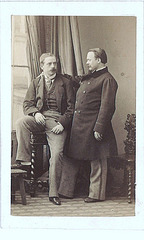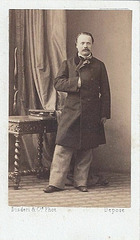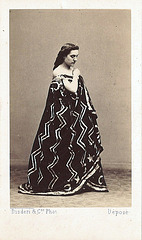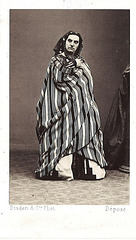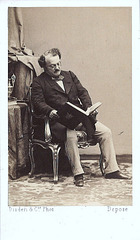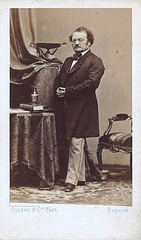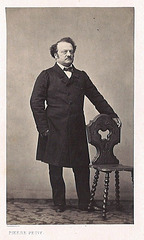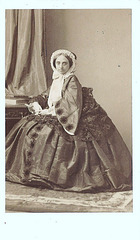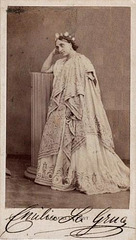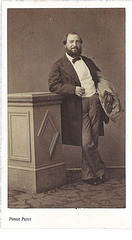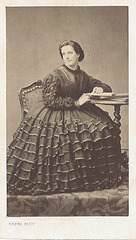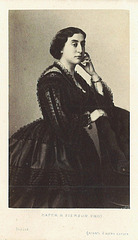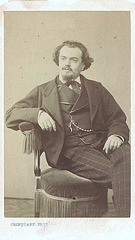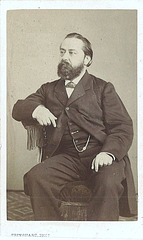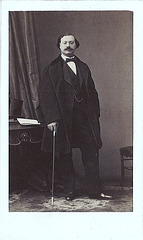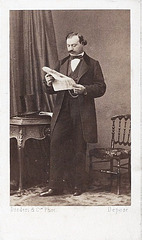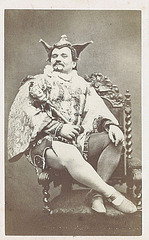
19th century opera singers
Enrico Tamberlick by Bergamasco (1)
| |
|
Enrico Tamberlick (1820-1889); Italian tenor who created the role of Don Alvaro in Verdi's "La forza del destino" in St. Petersburg (1862).
Enrico Tamberlick, who flourished during the middle of the 19th century was a tenor of high rank. He belonged to the class of "tenore di forza" and used to make a tremendous effect with his high C, which he produced with immense power. His voice was one of great richness of tone and volume. His delivery was grand and noble, his phrasing perfect and he sang with a great depht of expression. His elocution was so fine that every word was delivered with full effect and his dramatic power was unusually great. He was seen to best advantage in heroic parts, in which his fine figure and majestic bearing, together with the power and resonance of his voice, were displayed. Such parts as Jean de Leyde in "Le Prophète", Arnold in "Guillaume Tell", Manrico in "Il Trovatore", Otello in Rossini's "Otello", Pollione in "Norma", Poliuto in "Les Martyrs" and Robert in "Robert le Diable".
In 1841 he made his debut at the Teatro Fondo in Naples as Tybalt in Bellini’s "I Capuleti ed i Montecchi" under the name of Enrico Danieli (his mother's name). The following two years he continued his career in Naples at the Teatro Fondo and at the Teatro San Carlo (under the name of Tamberlick). His voice was not yet develloped into the tenor it would become later. From 1843 on he performed in Spain ( Madrid, Barcelona etc.) and Portugal (Lisbon). In 1850 he appeared in London and made his Covent Garden debut as Masaniello in Auber’s "La Muette de Portici". He became so great a favourite that he was engaged there every season until 1864, with the exception of the season 1857/58 when he was engaged at the Théâtre-Italien in Paris. Of equal importance during the years 1850/63 was St. Petersburg (the Mariinsky Theatre) where he made guest appearances. Here he created the role of Don Alvaro in Verdi's "La forza del destino" on 10 November 1862. He made his initial guest appearance at the Théâtre-Italien in Paris in 1858, returning there many times until 1877. In 1874 he made a tour of the USA and he was the first tenor of importance who visited South America, singing at Rio de Janeiro, Buenos Ayres and Montevideo. He performed Alfredo in "La Traviata" -with Sofia Vera Lorini as Violetta- for the opening of the original Teatro Colón opera house in Buenos Aires in 1857. He retired from the stage with a tour through Spain in 1881, but he continued giving occasional concerts.
Carlo Baucardé by Disdéri (1)
| |
|
Carlo Baucardé (1825-1883); Italian tenor who created the role of Manrico in Verdi's "Il Trovatore" in Rome (1853). The person on the right is Carlo Baucardé and the person on the left could well be his son.
Carlo Baucardé by Disdéri (2)
| |
|
Carlo Baucardé (1825-1883); Italian tenor who created the role of Manrico in Verdi's "Il Trovatore" in Rome (1853).
Adelaide Borghi-Mamo by Disdéri (1)
| |
|
Adelaide Borghi-Mamo (1826-1901); Italian mezzo-soprano.
She made her debut in 1843 in Mercadante’s “Il giuramento”. She sang at the première of Pacini’s “Malvina di Scozia” (1851) as Morna, she created the role of Olimpia in Mercadante’s “Statira” (1853), Odetta in Pacini’s “Romilda di Provenza” (1853) and Tremacoldo in Petrella’s “Marco Visconti” (1854.. All 4 premières were at the “Real Teatro di San Carlo” at Naples. She also sang the première of Rossi’s “L'alchimista” (1853) at the Teatro del Fondo in Naples.
From 1854 on she also performed in Paris at the Théâtre-Italien and the Paris Opera, where she created the role of Mélusine in Halévy’s “La Magicienne” (1858), Opympia in David’s “Herculanum” (1859) and Margherita in Braga’s “Margherita la mendicante” (1859). She sang at all the mayor opera houses in Italy (including several premières at “La Scala”) and also in London and Madrid.
In 1849 she married the Italian tenor Michele Mamo and they had a daughter (born only a few hours after her performance of Azucena in “Il Trovatore”) Erminia Borghi-Mamo (1855-1941) who was a well known soprano with an international career.
Adelaide Borghi-Mamo by Disdéri (2)
| |
|
Adelaide Borghi-Mamo (1826-1901); Italian mezzo-soprano.
She made her debut in 1843 in Mercadante’s “Il giuramento”. She sang at the première of Pacini’s “Malvina di Scozia” (1851) as Morna, she created the role of Olimpia in Mercadante’s “Statira” (1853), Odetta in Pacini’s “Romilda di Provenza” (1853) and Tremacoldo in Petrella’s “Marco Visconti” (1854.. All 4 premières were at the “Real Teatro di San Carlo” at Naples. She also sang the première of Rossi’s “L'alchimista” (1853) at the Teatro del Fondo in Naples.
From 1854 on she also performed in Paris at the Théâtre-Italien and the Paris Opera, where she created the role of Mélusine in Halévy’s “La Magicienne” (1858), Opympia in David’s “Herculanum” (1859) and Margherita in Braga’s “Margherita la mendicante” (1859). She sang at all the mayor opera houses in Italy (including several premières at “La Scala”) and also in London and Madrid.
In 1849 she married the Italian tenor Michele Mamo and they had a daughter (born only a few hours after her performance of Azucena in “Il Trovatore”) Erminia Borghi-Mamo (1855-1941) who was a well known soprano with an international career.
Gilbert-Louis Duprez by Disdéri (1)
| |
|
Gilbert-Louis Duprez (1806-1896); French tenor who became famous for being the first tenor to deliver the high C from the chest ( in 1831 as Arnold in the Italian première of Rossini's "William Tell"). He made his debut in 1825 in "Il barbière di Siviglia". He sang at many premières. The most known are: Edgardo in Donizetti's "Lucia di Lammermoor" (1835), the title-rôle in Berlioz' "Bevenuto Cellini" (1838), Fernando in Donizetti's "La favorita" (1840), Poliuto in Donizetti's "Les martyrs" (1840) and the title-rôle in Donizett's "Don Sébastiano" (1843). He ended his stage-career in 1849 and worked as a voice-teacher. His most famous pupils were his daughter Caroline Duprez, Marie Battu, Marie Miolan-Carvalho, Constance Nantier-Didiée and Emma Albani.
Gilbert-Louis Duprez by Disdéri (2)
| |
|
Gilbert-Louis Duprez (1806-1896); French tenor who became famous for being the first tenor to deliver the high C from the chest ( in 1831 as Arnold in the Italian première of Rossini's "William Tell"). He made his debut in 1825 in "Il barbière di Siviglia". He sang at many premières. The most known are: Edgardo in Donizetti's "Lucia di Lammermoor" (1835), the title-rôle in Berlioz' "Bevenuto Cellini" (1838), Fernando in Donizetti's "La favorita" (1840), Poliuto in Donizetti's "Les martyrs" (1840) and the title-rôle in Donizett's "Don Sébastiano" (1843). He ended his stage-career in 1849 and worked as a voice-teacher. His most famous pupils were his daughter Caroline Duprez, Marie Battu, Marie Miolan-Carvalho, Constance Nantier-Didiée and Emma Albani.
Gilbert-Louis Duprez by Petit
| |
|
Gilbert-Louis Duprez (1806-1896); French tenor who became famous for being the first tenor to deliver the high C from the chest ( in 1831 as Arnold in the Italian première of Rossini's "William Tell"). He made his debut in 1825 in "Il barbière di Siviglia". He sang at many premières. The most known are: Edgardo in Donizetti's "Lucia di Lammermoor" (1835), the title-rôle in Berlioz' "Bevenuto Cellini" (1838), Fernando in Donizetti's "La favorita" (1840), Poliuto in Donizetti's "Les martyrs" (1840) and the title-rôle in Donizett's "Don Sébastiano" (1843). He ended his stage-career in 1849 and worked as a voice-teacher. His most famous pupils were his daughter Caroline Duprez, Marie Battu, Marie Miolan-Carvalho, Constance Nantier-Didiée and Emma Albani.
Emilia La Grua by Disdéri (1)
| |
|
|
Emilia La Grua (1831-?); Italian soprano who created the role of Irène in Halevy's "Le juif errant" (1852). She had an important carreer in South-America.
Emilia La Grua by Laurent with autograph
| |
|
Emilia La Grua (1831-?); Italian soprano who created the role of Irène in Halevy's "Le juif errant" (1852). She had an important carreer in South-America.
The photo is signed by Emilia La Grua.
Joseph-Théodore-Désiré Barbot by Petit
| |
|
Joseph-Théodore-Désiré Barbot (1824-1897); French tenor who created the role of Doctor Faust in Gounod's opera Faust at the Théâtre Lyrique in Paris (1859). He was married to the soprano Caroline (Barbot) Douvry.
Caroline Barbot by Petit
| |
|
|
Caroline (Douvry) Barbot (1830-1893); French soprano who created the role of Leonora in Verdi's "La forza del destino" in 1862 in St. Petersburg. In 1861 she created the role of Maria in Pedrotti's "Mazeppa". In 1882 she created Virgile in "Francesca de Rimini" by Ambroise Thomas. She was married to the French tenor Joseph Barbot.
Erminia Frezzolini by Mayer & Pierson
| |
|
Erminia Frezzolini (1818-1884); Italian soprano who created the role of Giselda in Verdi's "I Lombardi" in 1843. She also created the role of Giovanna d'Arco by Verdi in 1845. Both premieres in Milano at La Scala. She was a pupil of her father, the famous bass- buffo Giuseppe Frezzolini (1789-1861), who in 1832 created the role of Dulcamara in the premiere of Donizetti 's "Elisir D'amore".
In 1837 she made her debut in Florence in the title role of Belllini's "Beatrice di Tenda ". Soon she became one the most important Donizetti and Bellini interpreters of her generation in Italy. In 1838 she sang at Siena and Ferrara, in 1839 at Pisa, Reggio Emilia, Perugia and Bologna, in 1840 at Turin. In 1840 she enthralled the audience of La Scala in the title role of Donizetti 's "Lucrezia Borgia". In 1842 and 1850 she sang at London, in 1852-53 at Madrid and in1853-57 in Paris. In 1846, she sang at the Teatro San Carlo Naples in the world premiere of Mercadante's "Gli Orazi ed I Curiazi". She made numerous guest appearances in Europe and North America. During the years 1841/46 she was married to the tenor Antonio Poggi (1806-75), who sang as her partner in the aforementioned premiere of "Gianna d' Arco" the role of King Charles VII of France.
Leone Giraldoni by Trinquart
| |
|
Leone Giraldoni (1824-1897); Italian baritone. He was married to the soprano Carolina Ferni (1839-1926) and father of the also famous baritone Eugenio Giraldoni (1871-1924). Among his premieres were the title-role of "Simon Boccanegra" by Verdi at the Teatro Fenice in 1857,Renato in "Un ballo in maschera" by Verdi at the Teatro Apollo (Rome) in 1859, the title role in Pedrotti's "Mazeppa" at the Gran Teatro Comunale di Bologna in 1861 and the title-role in Donizetti's "Il duca d'Alba" in 1882 also at the Teatro Apollo.
Gaetano Fraschini by Trinquart
| |
|
Gaetano Fraschini (1816-1887); Italian tenor who created many roles in 19th century opera's. Among them were 5 Verdi-premieres: Alzira (1845), Il Corsaro (1848), Il battaglia di Legnano (1849), Stiffelio (1850) and Ballo in maschera (1859).
Francesco Graziani by Disdéri (1)
| |
|
Francesco Graziani (1828-1901); Italian baritone who created the role of Don Carlo in Verdi's "La forza del destino" in St. Peterburg (1862). He was born into a musical family. Three of his brothers (tenor Lodovico 1820-1885, baritone Vincenzo 1836-1906 and bass Giuseppe 1819-1905) also became professional singers. His brother Lodovico was the first Alfredo in Verdi's La Traviata in1853. They all studied with Cellini and in 1851 Francesco made his debut in Ascoli Piceno as Conte di Vergy in Donizetti's "Gemma di Vergy". In the following years he performed in all the major opera houses in Italy including La Scala Milan. In 1854 he made a tour of guest appearances through the USA. In 1855 he made his Covent Garden debut in London as Don Carlo in Verdi's "Ernani". Until 1880 he returned to London almost every year and he performed in a number of English premières : in 1855 as Count di Luna in "Il Trovatore", in 1865 as Nelusco in "L'Africaine", in 1867 as Rodrigo in "Don Carlos" and in 1876 as Amonasro in "Aida". During the seasons 1853/61 he was also very successful in Paris at the Théâtre-Italien. In 1862 he created at St. Petersburg the role of Don Carlo in Verdi's "La forza del destino" with Enrico Tamberlick in the role of Don Alvaro. Graziani had one of the most beautiful baritone voices of his time, but from artistic point of view he appears not to have been very gifted. Critics of that time repeatedly referred to defects in his phrasing and they also doubted his musicality.
Francesco Graziani by Disdéri (2)
| |
|
Francesco Graziani (1828-1901); Italian baritone who created the role of Don Carlo in Verdi's "La forza del destino" in St. Peterburg (1862). He was born into a musical family. Three of his brothers (tenor Lodovico 1820-1885, baritone Vincenzo 1836-1906 and bass Giuseppe 1819-1905) also became professional singers. His brother Lodovico was the first Alfredo in Verdi's La Traviata in1853. They all studied with Cellini and in 1851 Francesco made his debut in Ascoli Piceno as Conte di Vergy in Donizetti's "Gemma di Vergy". In the following years he performed in all the major opera houses in Italy including La Scala Milan. In 1854 he made a tour of guest appearances through the USA. In 1855 he made his Covent Garden debut in London as Don Carlo in Verdi's "Ernani". Until 1880 he returned to London almost every year and he performed in a number of English premières : in 1855 as Count di Luna in "Il Trovatore", in 1865 as Nelusco in "L'Africaine", in 1867 as Rodrigo in "Don Carlos" and in 1876 as Amonasro in "Aida". During the seasons 1853/61 he was also very successful in Paris at the Théâtre-Italien. In 1862 he created at St. Petersburg the role of Don Carlo in Verdi's "La forza del destino" with Enrico Tamberlick in the role of Don Alvaro. Graziani had one of the most beautiful baritone voices of his time, but from artistic point of view he appears not to have been very gifted. Critics of that time repeatedly referred to defects in his phrasing and they also doubted his musicality.
Jean-Vital Jammes (Ismaël) by Carjat
| |
|
Jean-Vital Jammes known as "Ismaël" (1827-1893); French baritone who created several operatic roles. The most known are Zurga in Bizet's "Les pecheurs de perles" (1863) and Ourrias in Gounod's "Mireille" (1864). He also created the role of the Marquis de Moncontour in Delibes' "Le roi l'a dit" (1873) and the Prince of Mantua in Offenbach's "Fantasio" (1872).
On the photo he is seen as Rigoletto, his most successful role.
Jump to top
RSS feed- Latest items - Subscribe to the latest items added to this album
- ipernity © 2007-2024
- Help & Contact
|
Club news
|
About ipernity
|
History |
ipernity Club & Prices |
Guide of good conduct
Donate | Group guidelines | Privacy policy | Terms of use | Statutes | In memoria -
Facebook
Twitter

